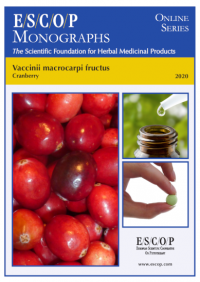
ESCOP monographs The Scientific Foundation for Herbal Medicinal Products. Online series. Vaccinii macrocarpi fructus (Cranberry). Exeter: ESCOP; 2020. 50 pages.
European Scientific Cooperative on Phytotherapy.
- Vaccinii macrocarpi fructus
Cranberry
Vaccinium macrocarpon Aiton. and Vaccinium oxycoccus L.
Published 2020
Format: PDF (50 pages)
>> Descargar PDF
>> Ver online (30¤/año, gratis para los socios de SEFIT)
SUMMARY
The herbal monograph selects and summarises scientific studies regarding efficacy, dosage, and safety, that are relevant to the therapeutic uses of cranberry.
This herbal substance by definition consists of the ripe, fresh, or dried fruits of Vaccinium macrocarpon Aiton or Vaccinium oxycoccus L.
Studies with its main characteristic constituents proanthocyanidins; quinic, malic, and citric acids; hydroxybenzoic acids; hydroxycinnamic acids, anthocyanins, flavonol glycosides, iridoids, and ursolic acids are included.
The therapeutic indication is the prevention of urinary tract infections.
Administration of cranberry addresses posology; its duration of use; contra-indications; special warnings; special precautions for use; interactions with other medicinal products; other forms of interaction; in pregnancy and lactation; its effects on the ability to drive; undesirable effects; overdose.
In vitro experiments with cranberry demonstrate anti-adherence, anti-inflammatory, antiviral, antimicrobial, cytotoxic, antioxidant properties, as well as effects on enzymes involved in drug metabolism. In vivo experiments in animals demonstrate anti-adherence, anti-inflammatory, antimicrobial and antitumor activities, protective effects on intestinal mucosa and kidneys, effects on lipids and glucose metabolism.
Pharmacological studies with cranberry juice or its extract in humans concern anti-adherence, anti-inflammatory, antioxidant and antimicrobial activity and effects on urinary stone risk factors.
Pharmacokinetic properties were investigated in animals and in humans.
Controlled clinical studies with cranberry preparations demonstrated its effects in the prevention of bacteriuria and symptomatic urinary tract infections (UTIs), in patients with neurogenic bladder (NB), in metabolic syndrome, against cardiovascular risk factors, and for the prevention of urinary symptoms in patients undergoing radiation therapy.
Preclinical safety data for cranberry were assessed in toxicity studies.
Safety data were assessed in human studies.
The selection of literature cited in the monograph is aimed at compiling relevant examples of the possible physiological roles of cranberry and its major constituents.
KEYWORDS
Vaccinii macrocarpi fructus
Cranberry
Vaccinium macrocarpon Aiton.
Vaccinium oxycoccus L.
Urinary disorders
Prevention of urinary tract infections
